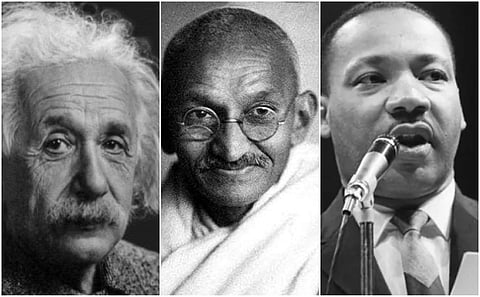

On Mahatma Gandhi’s 150th birth anniversary, most people would remember him as the ‘Father of the nation’, the torchbearer of India’s independence struggle, a face sometimes guiding and often extending support to many of the country’s biggest nationalist movements.
But Mohan Das Karamchand Gandhi was an international persona too, and not just for his much-talked-about advocacy against racial segregation and apartheid in South Africa but also because he was an inspiration to many renowned personalities who have reached the pinnacle of their stream, namely, Albert Einstein and Martin Luther King Jr.
Einstein, in fact, expressed admiration for Bapu in his letters and audio recordings addressed to him, dating back to 1931, before World War 2 began. He was particularly fond of Gandhi’s non-violent school of thought, ideologies and policies.
Excerpts from one of the letters translated from German, preceding the dropping of atomic bombs in Hiroshima and Nagasaki, read in part, “You have shown through your works, that it is possible to succeed without violence even with those who have not discarded the method of violence.”
Gandhi’s pacifist orientation appealed to him greatly and he referred to it as an “instinctive feeling” based only on “deepest antipathy to every kind of cruelty and hatred,” rather than any “intellectual theory."
Further, the concept of satyagraha, which roughly translates as “devotion to the truth,” also appealed to him, who was vehemently opposed to war.
Perhaps because despite inventing the atom bomb and drafting detailed letters cautioning then US President Franklin D. Roosevelt against its usage, his heart remained committed to the path Gandhi ji had long ago chosen for himself and his country at large.
Gandhi also continued to enlighten the lives of other revered personalities, harbingers of change and revolution like one of the most dynamic Civil Rights Activists, Martin Luther King Jr.
Etched in the history of United States for King's iconic "I have a dream" speech, he often sought his inspiration from Mahatma Gandhi.
In fact, King was introduced to Gandhi’s writings much early in life, during his college days, and often drew a parallel between Bapu’s methods and his own biblical beliefs.
Though both leaders never got a chance to meet each other, (as Gandhi was assassinated when King was 19 years old) he learnt more about Gandhi through his works and when he visited India in 1959.
Gandhi’s connect with African-Americans, his resilience against oppressors by non-violent means, were all seeds that King ultimately harvested in his own civil rights movements in the US.
When on February 10, 1959, he finally visited India, he said, “To other countries, I may go as a tourist but to India, I come as a pilgrim.”
In a broadcast on All India Radio, King had said: “If this age is to survive, it must follow the way of love and non-violence that Gandhi so nobly illustrated in his life.”
Many claim that one of the reasons why the Civil Rights Movements in the US during the 1960s flourished was because it derived its strength and endurance through Gandhi's resolve to address all kinds of evils, whether they were the ones that plagued India or any other place, section of the society.
Perhaps, non-violence really was the common element between the two leaders that fuelled King’s drive for his own struggles back home.
Ultimately, irrespective of any place’s socio-economic climate and realities, some principles are universal.
The desire to lead a life free from hostility, violence and blood bath connects humans from across the globe, it is the inherent ‘humanness’ that makes people think on similar lines and enables nobles like Albert Einstein and Martin Luther King Junior, who carved their niche in their own field, fought their own battles to draw inspiration from India’s very loved and revered ‘Mahatma’.